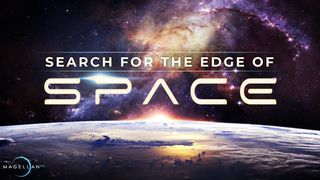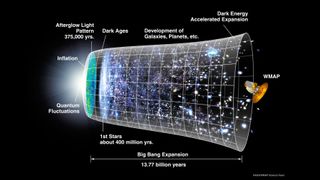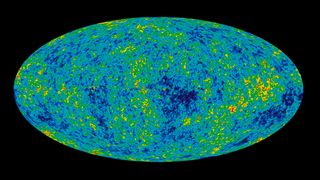New documentary 'Search for the Edge of Space' is free on Magellan TV until Dec. 16
The controversy about the universe's size goes at least as far back as Ancient Greece.

Thousands of years about the universe's nature backdrop a documentary available for free on Magellan TV.
The 42-minute special, "Search for the Edge of Space," will be free until Thursday (Dec. 16), Magellan said in a press release. The documentary features the ongoing quest of observatories like the Hubble Space Telescope and the Vera C. Rubin Observatory to learn the size, shape and structure of the cosmos.
"In recent times, giant new telescopes have allowed us to cast our gaze into the deepest reaches of the known universe," narrator Matt Baker ("Mars Calling") says in the documentary's introduction.
"Astronomers have concluded that the stars and galaxies that stretch out to the limits of our vision may represent only a small fraction of all there is. They are pioneering new theories that describe a universe that extends far beyond the limits of our vision."
Related: Streaming deals: Discounts on Disney Plus and Paramount Plus

The documentary is the latest in a string of space-themed films directed, executive produced and/or written by MagellanTV co-founder Thomas Lucas ("Mars Calling"; "Other Earths: The Search for Habitable Planets.")
As the show demonstrates, today's debates about how fast the universe is expanding, and the nature of dark matter and dark energy, are just the latest facets of some 2,000 years of discussion about how the cosmos behaves.
Get the Space.com Newsletter
Breaking space news, the latest updates on rocket launches, skywatching events and more!
The ancient Greeks were the first, as far as we can tell from history, to begin separating the study of natural sciences from the nature of the gods. Aristotle famously said the Earth is distinct from the stars, and the stars are made of an unchanging element known as quintessence that are very different from our own planet. (Today, we know the stars and planets share elements.)
While many of Aristotle's views persisted to the Renaissance, not everyone agreed, including some of the Islamic scholars who translated his work in the Middle Ages. Even in Aristotle's own era and society, Greek mathematician Pythagoras and his followers found infinity (against Aristotle's belief of a finite universe) in of all things, numerical relationships.
The Pythagoreans investigated the mathematics of pi — which scientists recently proved, to five trillion digits' accuracy, does not repeat numbers. But the news didn't go down well, if tales of the time could be believed.
"The discovery of the so-called 'irrational numbers' like pi was so disturbing, legend has it, that one member of the Pythagorean cult — Hippasus — was drowned at sea for divulging their existence," Baker says.
Things began to change with both the invention of new mathematics and the addition of a new observing tool, the telescope, starting in the mid-16th century. The documentary quickly steps through the findings of major period luminaries to show how human thinking about the universe evolved.
Some key names cited include Nicolaus Copernicus (whose work was the basis of our understanding today that the sun is at the center of our solar system, not the Earth), celestial cataloger Tycho Brahe and Jupiter moon discoverer Galileo Galilei, among others. Closer to the modern day, Albert Einstein's work on relativity and Georg Cantor's calculations leading to the mathematics of infinity are cited as underlaying our understanding of the universe's behavior.

Today there are numerous studies happening to figure out the universe's history and future, the documentary says.
Ongoing studies of the cosmic microwave background (a leftover of the Big Bang) by multiple observatories are showing how the young universe began to expand. The atom-smashing Large Hadron Collider is trying to figure out how the Big Bang worked, too, by studying particles.
Meanwhile, telescopes in space and on Earth are working to learn about the universe's expansion from direct observation. The Sloan Digital Sky Survey is making 3D galaxy maps to see in which directions the galaxies are expanding, and how quickly. The Dark Energy Survey, which concluded observations in 2019, is still publishing data on how dark energy affects the universe's expansion.
Astronomers with Vera Rubin and other observatories are currently engaged in a project mapping black holes from early in the universe, in an attempt to solve one of inflationary theory's "wilder predictions": that we live in a multiverse, according to the documentary. You can watch the show to learn a little more about how the observations work.
"In the ultra dense conditions of early times, more than one universe would have inflated, perhaps, within one of those primordial black holes," Baker says of the study. "From our vantage point of the outside, these objects would appear simply as black holes. [But] if you could go inside, a baby universe would appear to be expanding outward, much like our own."
Follow Elizabeth Howell on Twitter @howellspace. Follow us on Twitter @Spacedotcom and on Facebook.
Join our Space Forums to keep talking space on the latest missions, night sky and more! And if you have a news tip, correction or comment, let us know at: community@space.com.

Elizabeth Howell (she/her), Ph.D., is a staff writer in the spaceflight channel since 2022 covering diversity, education and gaming as well. She was contributing writer for Space.com for 10 years before joining full-time. Elizabeth's reporting includes multiple exclusives with the White House and Office of the Vice-President of the United States, an exclusive conversation with aspiring space tourist (and NSYNC bassist) Lance Bass, speaking several times with the International Space Station, witnessing five human spaceflight launches on two continents, flying parabolic, working inside a spacesuit, and participating in a simulated Mars mission. Her latest book, "Why Am I Taller?", is co-written with astronaut Dave Williams. Elizabeth holds a Ph.D. and M.Sc. in Space Studies from the University of North Dakota, a Bachelor of Journalism from Canada's Carleton University and a Bachelor of History from Canada's Athabasca University. Elizabeth is also a post-secondary instructor in communications and science at several institutions since 2015; her experience includes developing and teaching an astronomy course at Canada's Algonquin College (with Indigenous content as well) to more than 1,000 students since 2020. Elizabeth first got interested in space after watching the movie Apollo 13 in 1996, and still wants to be an astronaut someday. Mastodon: https://qoto.org/@howellspace
